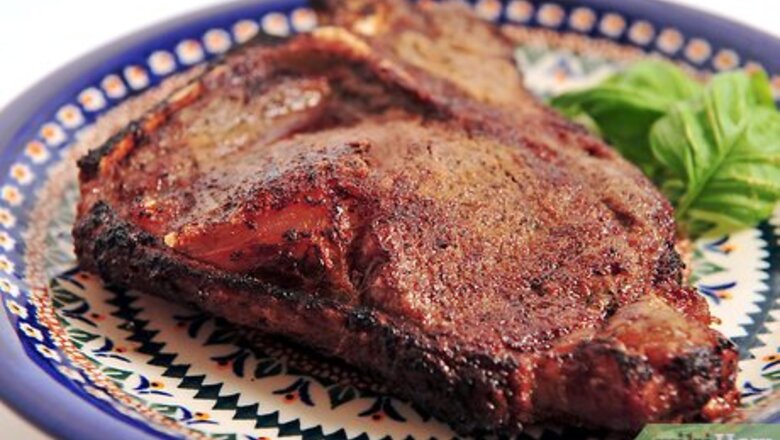
views
Learning What to Eat
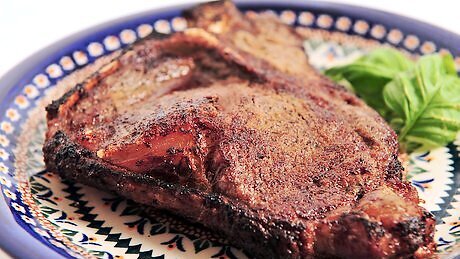
Eat sufficient amounts of protein. The rule of thumb is that you need between 0.7 and 0.8 times your body weight in grams of protein. For example, if you weigh 150 pounds, you should eat between 105 and 120 grams of protein per day if you want to consistently gain muscle. If you're overweight, substitute your ideal body weight and calculate in grams. Proteins that are great for building muscle include: Lean red meat like beef, pork, lamb, venison, bison, etc. Fish like tuna, salmon, swordfish, bass, trout, mackerel, etc. Poultry breast, from chicken, turkey, duck, etc. Eggs (including the yolks) Dairy like milk, cheese, cottage cheese, yogurt, etc.
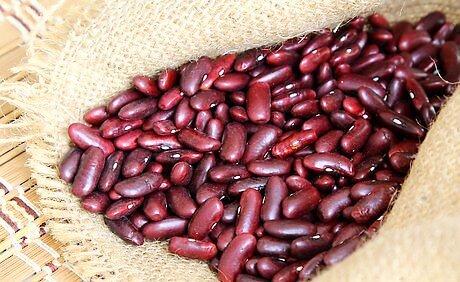
Learn the difference between complete and incomplete proteins. In order to build muscle, you need to consume complete proteins found in eggs, meat, fish, cheese, milk and most other animal products. Rule of thumb: If it bleeds or breathes, it's a complete protein. There are lots of non-animal complete proteins available, as well, meaning that you can still build muscle as a vegetarian. Complete vegetarian proteins include: Soy Quinoa Buckwheat Chia Hempseed Beans or legumes with rice
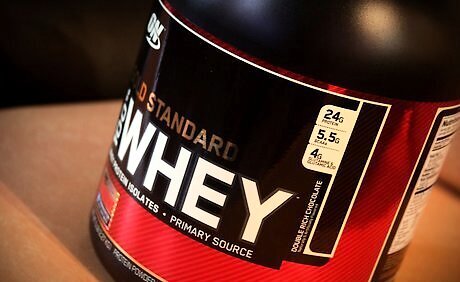
Eat foods with a high Protein Digestibility Corrected Amino Acid Score (PDCAAS). This is a measure of how well different proteins are digested by the body, based on the solubility of the amino acids in the protein. Think of PDCAAS as grading the quality of protein, with 1 being the highest score and 0 the lowest. Here's a breakdown common proteins by their rounded PDCAAS score: 1.00: egg, whey, casein, soy protein 0.9: beef, soybeans 0.7: chickpeas, fruits, black beans, vegetables, other legumes 0.5: cereals and derivatives, peanuts 0.4: whole wheat
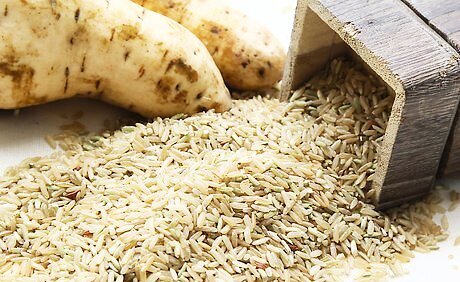
Include carbohydrates in your diet. It is important to have carbohydrates so that your body can tap into glycogen (energy) stores within your muscles while you are working out. If you do not eat enough carbohydrates your body will not have energy reserves and will break down your muscles instead! To build muscle, your diet should consist of somewhere between 40% and 60% carbohydrates, or about 1,500 calories per day. Carbs get an unfairly bad reputation from dieting guides. Because complex carbs are broken down slowly and have a low-glycemic index (not as much sugar), they are acceptable to eat after a workout, and especially in the morning at breakfast. Try to select carbohydrates low on the Glycemic Index, which are healthier and release their energy more slowly. Good examples are: Brown Basmati Rice Quinoa Rolled Oats Sweet Potato Wholemeal Rye Bread Wholemeal Spaghetti
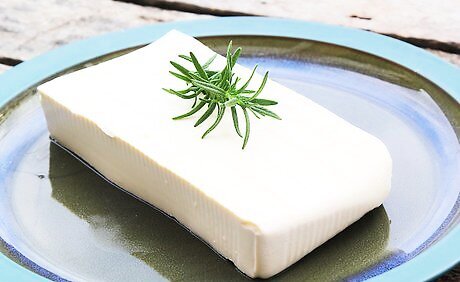
Eat healthy fats. Not all fats are created equal. In fact, there is evidence to suggest that eating healthy fats is actually good for you. You should get about 10% of your calories from fats. Eat monounsaturated and polyunsaturated fats. These are the "better" fats. They include: Olive, peanut, sunflower, canola, and avocado oils Fish Nuts Flaxseed and pumpkin seeds Soy products such as tofu or soy milk
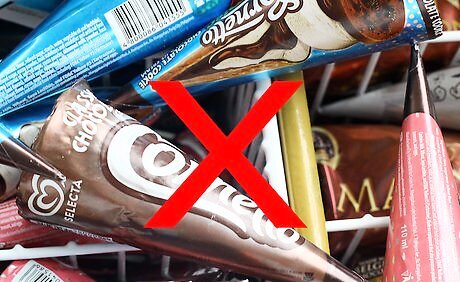
Limit saturated and trans fats. While there is conflicting evidence about saturated fats and their value in your diet, it is best to limit them. Make sure saturated fats make up no more than 10% of your caloric intake. Trans fats, on the other hand, are proven to be unhealthy ("bad" fats) and should make up no more than 1% of your caloric intake. Bad fats include: Ice cream, candy bars, and packaged snack foods High-fat cuts of meat Lard, stick margarine, and vegetable shortening Fried foods
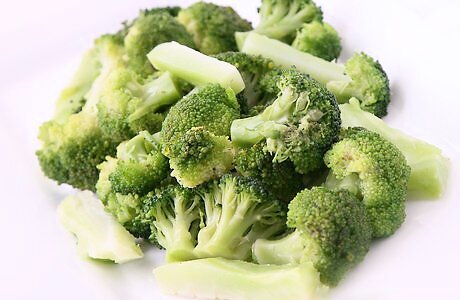
Consume plenty of fiber. Remember it is important to include green vegetables in your diet such as spinach or broccoli to ensure that you receive an adequate amount of vitamins. As well, green leafy vegetables are high in fiber which is essential for removing waste from the body.
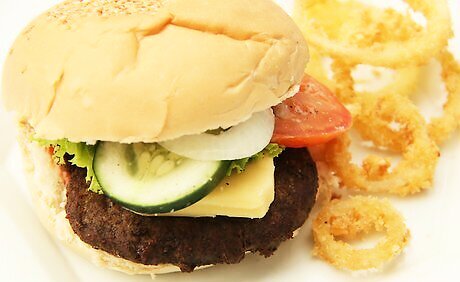
Monitor your salt intake. It may be true that excessive consumption of salt can lead to hypertension but you lose tremendous amounts of sodium when you sweat. Also, sodium (a key electrolyte) aids in muscle contraction, which is one reason why it is found in many sports drinks. Research suggests that replacing regular salt with potassium or magnesium salts can reduce sodium intake and may even lower blood pressure in those with high to normal blood pressure.
Learning How to Eat
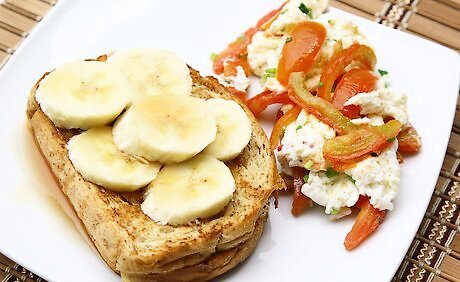
Eat when you're hungry. Sounds obvious right? Many muscle-builders get fooled into thinking muscle-building diets need to be more elaborate and complicated than they really do. Eating what you like, within the parameters mentioned in the previous section, is the key to gaining muscle mass consistently. If you're not eating what you like in a regular pattern, it'll be harder to consistently follow through with your diet. Here's a sample diet to give you a better idea of what someone might eat throughout the day: Breakfast: whole egg omelet with turkey, whole grain toast, banana Pre-lunch snack: mixed nuts, apple Lunch: tuna salad with olive oil, onions and capers; sautéed kale Pre-workout snack: cottage cheese with blueberries Post-workout snack: protein shake (blend in greens like kale or spinach) Dinner: orange-soy chicken breast with quinoa; stir-fried carrots, onions, peas, and peppers
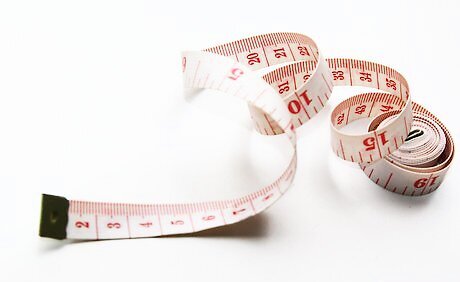
Create a calorie surplus. For many muscle-builders, it's important to combine an increase in protein with an increase in calories, so all your hard work at the gym won't work against you. You've got to build up enough fuel to burn as a way of building up your muscles, but not eat so many calories that they'll be transferred into fat. There's an ideal surplus of calories that you can find by calculating your maintenance calorie count, and your surplus. Your maintenance calorie count is the number of calories you need to consume in an average day, with an average amount of energy output, to maintain your current body-weight. For most people with a healthy body-weight, this is around 2,000 calories. Men should surplus about 250 calories a day (bringing the total to 2,250), while women should surplus about 150 calories a day (bringing the total to 2,150). Over the course of a given week of muscle-building exercise and proper nutrition, this calorie increase should translate into roughly .25 – .5 pounds of muscle gained per week.

Always eat breakfast. Breakfast is probably the most important meal of the day aside from your post-workout meal. Eating a breakfast packed with protein, complex carbohydrates, and fiber will get your metabolism going. It will also keep your body from cannibalizing any muscle for energy. Remember the saying: "Eat breakfast like a king, lunch like a prince, and dinner like a pauper." Because you're not on a diet, however, you don't have to be a pauper at any time. Get protein into your breakfast. Omelets, shakes (or smoothies) and cottage cheese are great sources of protein. Eat complex carbohydrates for breakfast. While simple carbohydrates such as sugar and donuts are broken down easily and cause a spike in your sugar levels, complex carbs (oatmeal, bran, beans, whole grains) are broken down over longer periods of time and don't cause spikes in blood sugar.
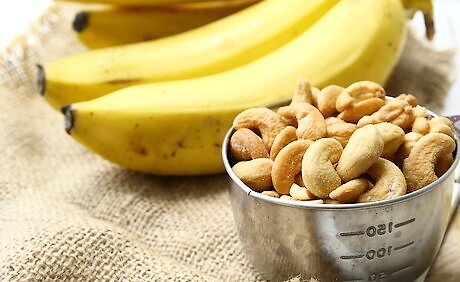
Eat less food more often. Eat at regular intervals to keep from getting so hungry that you splurge when you do eat. Your body will start to get hungry at the predetermined times you do eat because you've kept a consistent routine. Try eating breakfast, lunch, dinner, post workout, before bed (at least an hour before going to sleep) and slip in two snacks in between. Snacks can include everything from nuts and seeds to sides of veggies or fruit. If you're trying to gain muscle and lose weight, skip the before-bed meal. Eating right before you go to bed will cause the body to convert any unmetabolized food into fat instead of energy or muscle. Your body's metabolism shuts down right before bedtime.
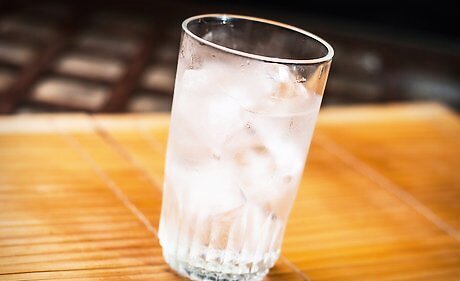
Drink plenty of water all throughout the day. Dehydration can mean poor muscle recovery, so make sure you drink lots of water throughout the day. Sip on water throughout your workout. The recommended daily amount of water for men is about 3 liters (0.8 US gal), and 2.2 liters (0.6 US gal) for women. If you don't like the taste of your tap water, get a water filter for your sink. Buying a water filter is an economical way of converting your tap water into healthy, great-tasting water. Buy one and see your water consumption grow. Don't wait until you're thirsty to drink. Keep a steady supply of water going into your body, so you won't have to gulp or binge on water when you're dehydrated, which risks upsetting your stomach during workouts.
Using Supplements Safely
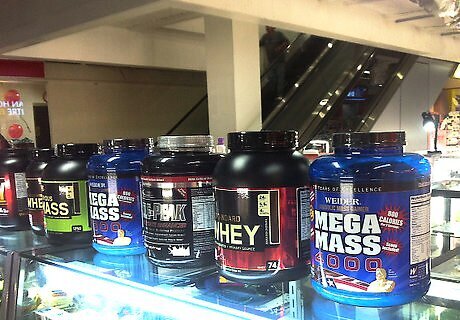
Decide whether or not supplements are right for you. Natural protein and muscle-building supplements are an easy way to gain more protein without having to actually eat it. Whey and soy proteins are common varieties. To start, take whey before and after your workouts. Whey powder is the easiest, safest, and most effective way to start using muscle-building supplements. Available widely, whey powder is available in large quantities and easy to use. You can mix it into a shake that's often available in a variety of flavors, and drink it before and after your workouts. Base the amount of powder you use on your daily protein requirements. Read the instructions on the supplement you're experimenting with and tweak the formula accordingly.
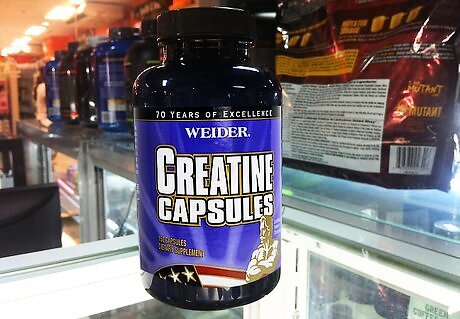
Consider creatine. Creatine is thought to help increase pure muscle mass and help regenerate muscles when not working out, but studies are inconclusive; many studies suggest that creatine causes the muscle tissue to retain fluid, leading to water weight gain. You may want to experiment with creatine but remember it is a supplement and is not necessary to gain muscle mass. Up to 10 grams (0.35 oz) of creatine, 3 – 5 grams taken before and after workouts, can help boost adenosine triphosphate (ATP) production, making you stronger during workouts, making it easier to build muscle. If you do take the creatine, be sure to drink plenty of water, because the creatine dehydrates your muscles while regenerating and also imbalances your electrolyte levels. Talk to your doctor about your muscle-building regimen to learn more about whether or not supplements might be right for you, given your history and your health.
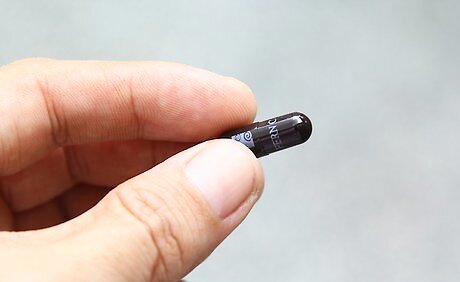
Take Vitamin C to aid recovery and stimulate muscle growth. Vitamin C is an antioxidant that helps to neutralize free radical molecules that make work-out recovery a challenge. 500 mg of Vitamin C taken daily will help you maintain a healthy immune system. Gradually, you can build up your Vitamin C intake, to as much as 2000 mg for optimum benefit.
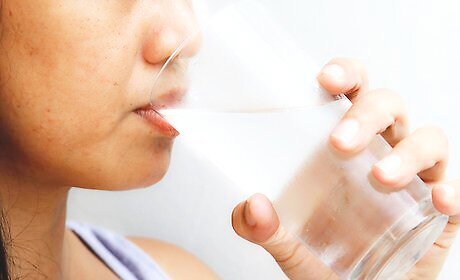
Be especially careful about hydrating. Some doctors say that whey protein is difficult to digest and can strain your liver or kidneys, especially in large amounts. A high protein diet in general can be straining on the kidneys, so it is important to drink a lot of water. This will flush out your system and negate the negative effects of eating a high protein diet.




















Comments
0 comment